It's not easy expressing your adoration for the woman in your life. Select some love poems for her and tell her how you really feel.
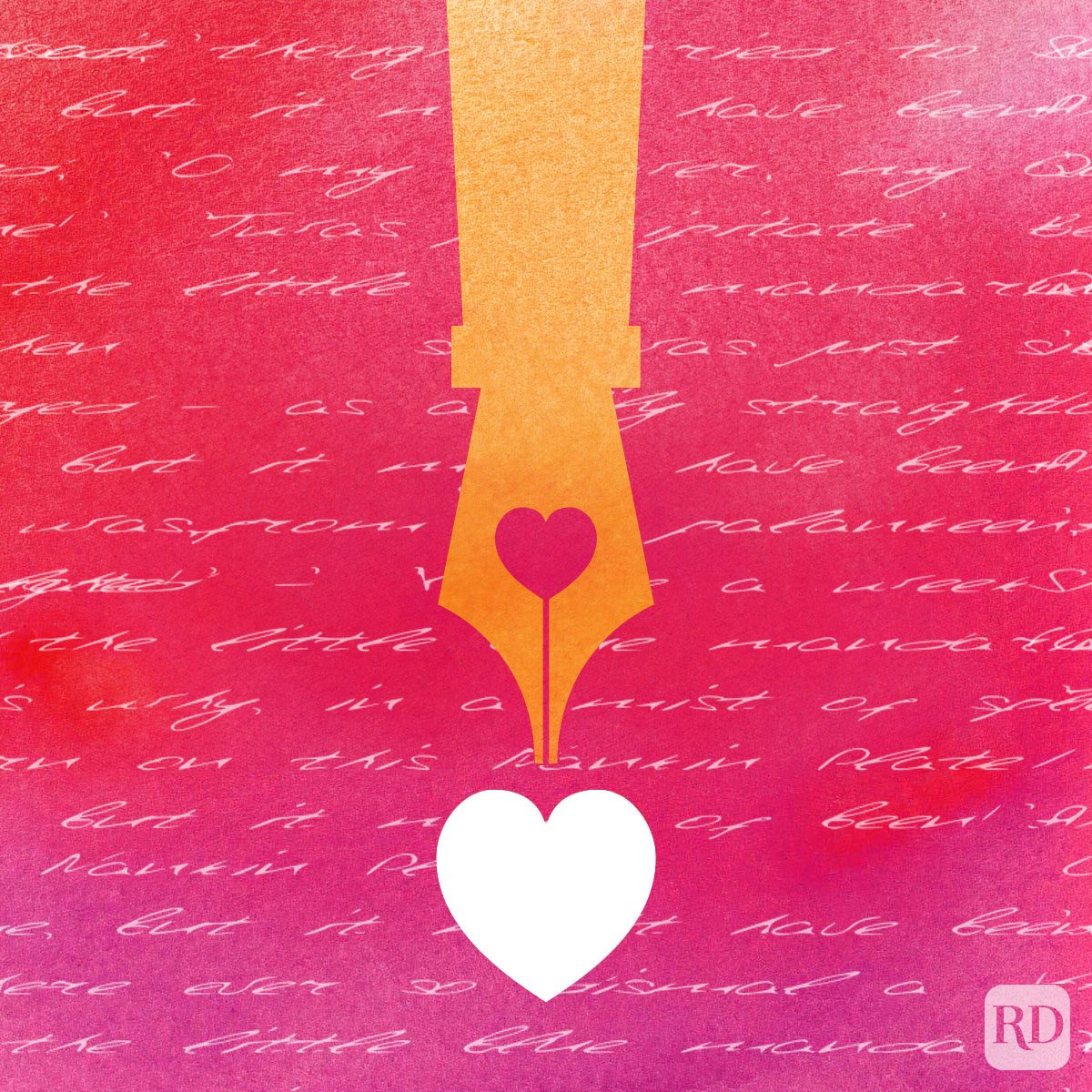
12 Love Poems That’ll Make Her Fall Deeper in Love with You

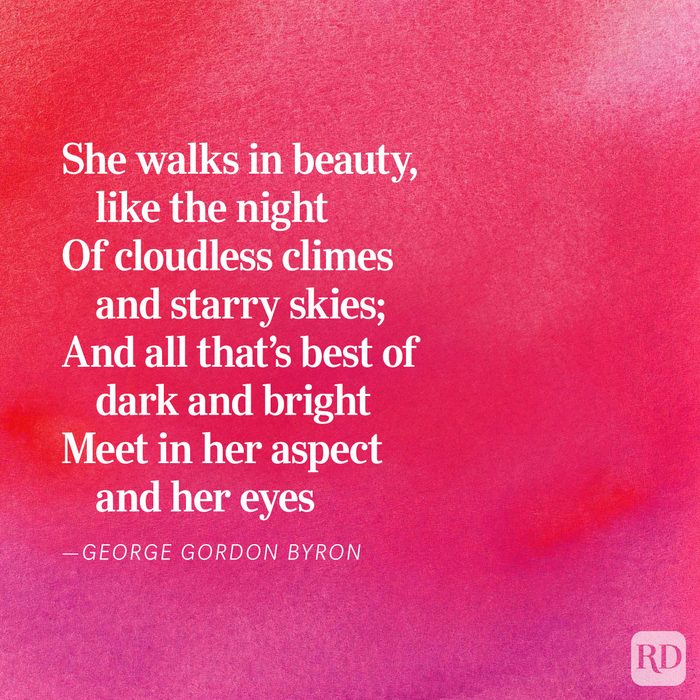
1. “She Walks in Beauty” by George Gordon Byron
She walks in beauty, like the night
Of cloudless climes and starry skies;
And all that’s best of dark and bright
Meet in her aspect and her eyes:
Thus mellowed to that tender light
Which heaven to gaudy day denies.
Lord Byron (1788–1824) is one of the most famous names in English poetry, a true pioneer and the man behind the epic satirical poem Don Juan. He also penned one of the most beautiful love poems ever, “She Walks in Beauty,” in which he expresses love through gorgeous symbolism and comparisons with all the beautiful things in nature. He ends the third stanza of “She Walks in Beauty” with a simple declaration: His love is innocent, and all he wants is to admire the woman he loves for her beauty, both inner and outer.
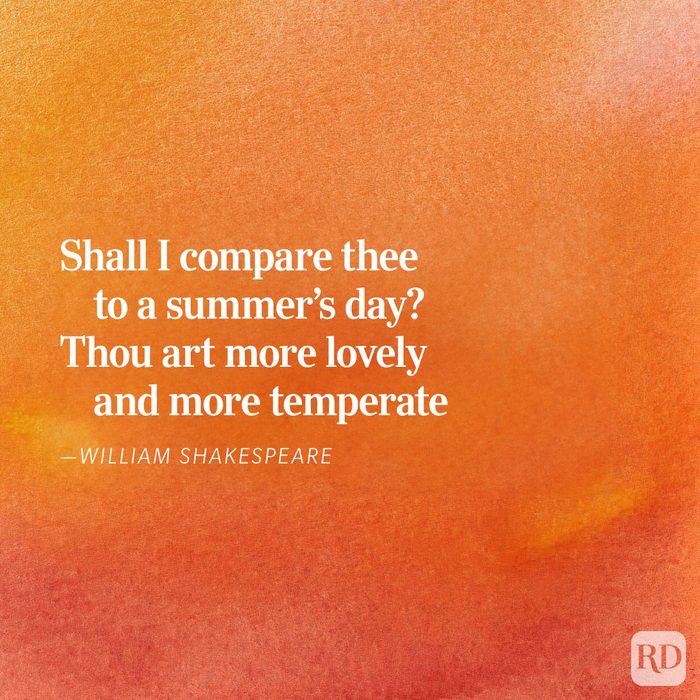
2. “Shall I compare thee to a summer’s day? (Sonnet 18)” by William Shakespeare
Shall I compare thee to a summer’s day?
Thou art more lovely and more temperate:
Rough winds do shake the darling buds of May,
And summer’s lease hath all too short a date;
Sometime too hot the eye of heaven shines,
And often is his gold complexion dimm’d;
And every fair from fair sometime declines,
By chance, or nature’s changing course, untrimm’d;
But thy eternal summer shall not fade,
Nor lose possession of that fair thou ow’st;
Nor shall death brag thou wander’st in his shade,
When in eternal lines to time thou grow’st:
So long as men can breathe or eyes can see,
So long lives this, and this gives life to thee.
Out of all the love poems for her, this might be the most quoted of all time, with the opening question one of the Shakespeare phrases you undoubtedly know. In the Bard’s famous “Sonnet 18,” the speaker compares his love’s beauty to that of a summer’s day, only to conclude that the latter lacks certain qualities. Summer days are beautiful and warm, but their charm fades with time—unlike that of his beloved.
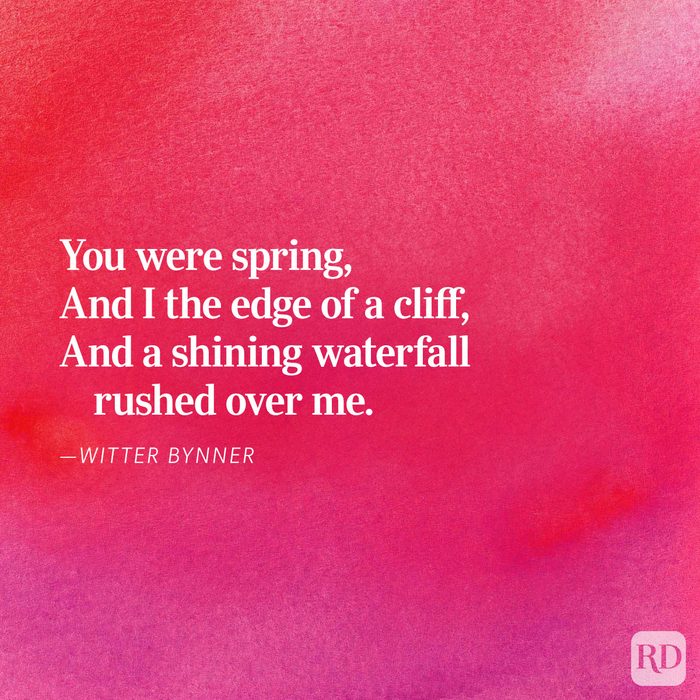
3. “At the Touch of You” by Witter Bynner
At the touch of you,
As if you were an archer with your swift hand at the bow,
The arrows of delight shot through my body.
You were spring,
And I the edge of a cliff,
And a shining waterfall rushed over me.
While most love poems focus on emotion, Witter Bynner (1881–1968) doesn’t shy away from sensuality and the physical experience of romance. He longs for the touch of his beloved, which to him, feels like being shot with an arrow or having a waterfall rush over him.
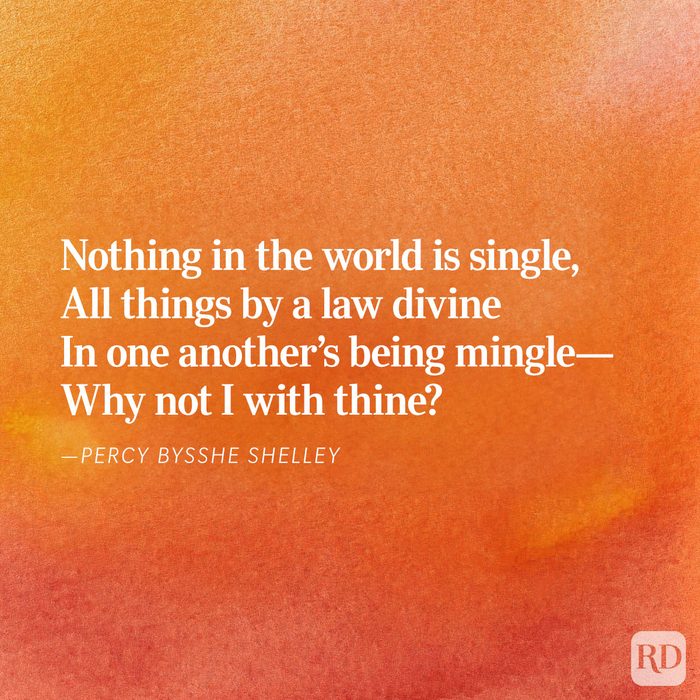
4. “Love’s Philosophy” by Percy Bysshe Shelley
The fountains mingle with the river
And the rivers with the ocean,
The winds of heaven mix for ever
With a sweet emotion;
Nothing in the world is single,
All things by a law divine
In one another’s being mingle—
Why not I with thine?
See the mountains kiss high heaven,
And the waves clasp one another;
No sister-flower would be forgiven
If it disdain’d its brother;
And the sunlight clasps the earth,
And the moonbeams kiss the sea—
What is all this sweet work worth
If thou kiss not me?
If you want to declare commitment, longing and romance, then this is the love poem for her. Reading almost like a poem about nature, “Love’s Philosophy” lists connections that happen naturally in our world—and that life depends upon—before comparing those with the poet’s longing to be united with his beloved. To Percy Bysshe Shelley (1792–1822), this connection is as essential and vital as any other.
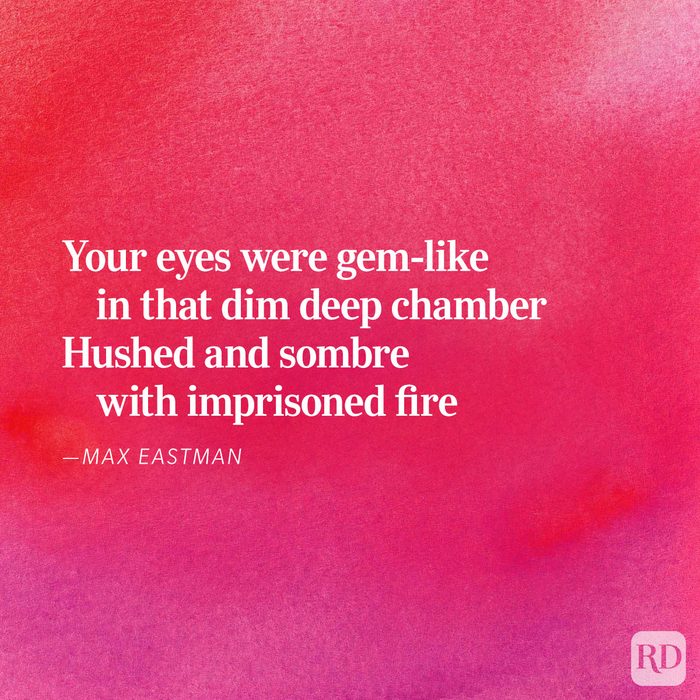
5. “X Rays” by Max Eastman
Your eyes were gem-like in that dim deep chamber
Hushed and sombre with imprisoned fire,
With yellow ghostly globes of intense aether
Potent as the rays of pure desire.
Your voice was startled into vivid wonder,
When the winged wild whining mystic wheel
Took flight and shot the dark with frosty crashings
Like an ice-berg splitting to the keel.
What sets “X Rays” apart from other love poems for her is the level of intimacy expressed in its verses. Throughout the full poem, Max Eastman (1883–1969) invites us into details that only he and his beloved know, and it is these very details that render it such a potent work. It’s private yet universally relatable.
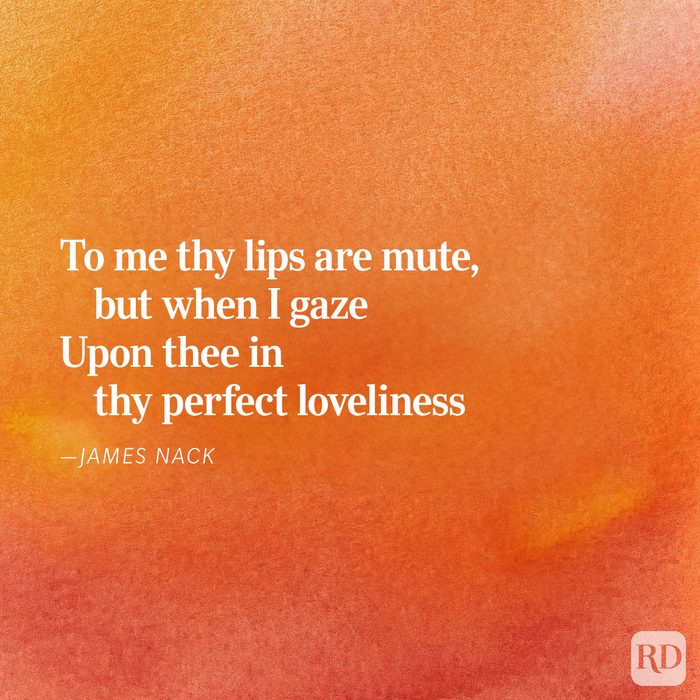
6. “The Music of Beauty” by James Nack
To me thy lips are mute, but when I gaze
Upon thee in thy perfect loveliness,—
No trait that should not be—no lineament
To jar with the exquisite harmony
Of Beauty’s music, breathing to the eyes,
I pity those who think they pity me;
Who drink the tide that gushes from thy lips
Unconscious of its sweets, as if they were
E’en as I am—and turn their marble eyes
Upon thy loveliness, without the thrill
That maddens me with joy’s delirium.
In one of my favorite love poems, deaf poet James Nack (1809–1879) not only praises his lover with exquisite poetry, but he also intimates that not being able to hear her speak allows him to fully see her beauty, unlike those who can hear.
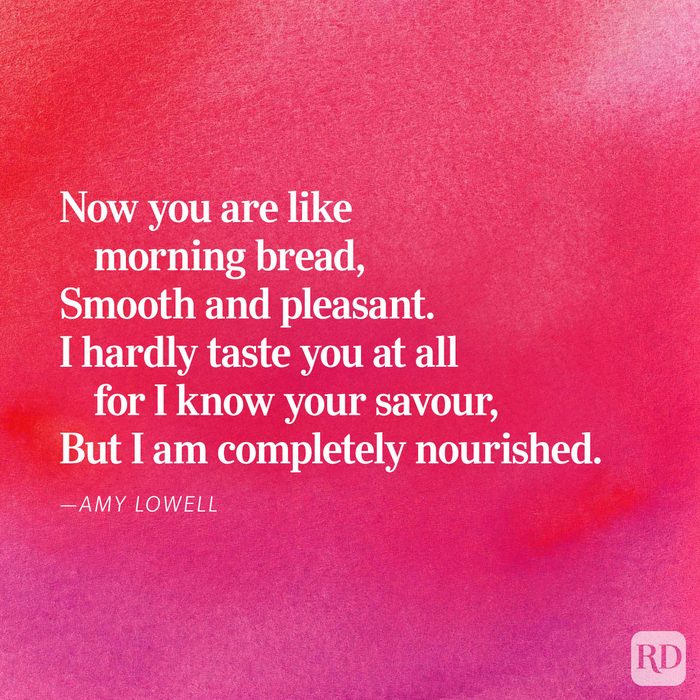
7. “A Decade” by Amy Lowell
When you came, you were like red wine and honey,
And the taste of you burnt my mouth with its sweetness.
Now you are like morning bread,
Smooth and pleasant.
I hardly taste you at all for I know your savour,
But I am completely nourished.
The beauty of love is not in momentary passion but rather in lasting comfort. That is exactly what this poem by Amy Lowell (1874–1925) conveys: the unique charm of lasting romance, presumably one that’s lasted a decade. It has only six lines, yes, but who says short poems can’t be just as powerful as longer works?
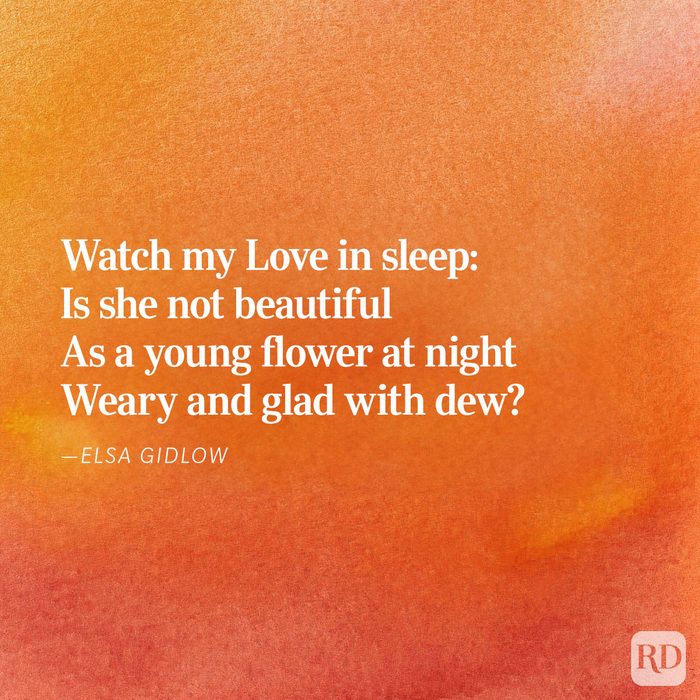
8. “Love Sleep” by Elsa Gidlow
Watch my Love in sleep:
Is she not beautiful
As a young flower at night
Weary and glad with dew?
Pale curved body
That I have kissed too much,
Warm with slumber’s flush;
Breasts like mounded snow,
Too small for children’s mouths;
Lips a red spring bud
My love will bring to bloom.
To call Elsa Gidlow (1898–1986) a pioneer is an understatement. She is the first poet to publish a collection of lesbian poetry in North America. In “Love Sleep,” she describes her lover’s beauty as she slumbers, and as the full poem progresses, her admiration intensifies.
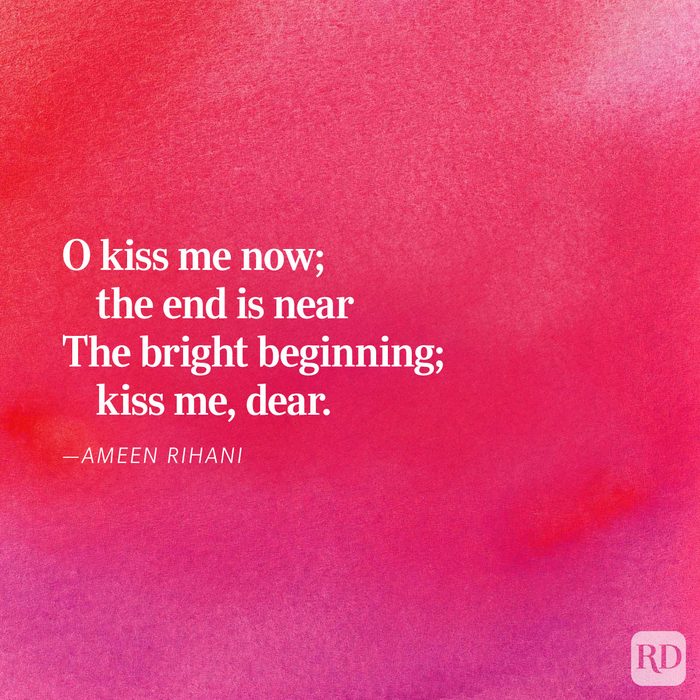
9. “The First and Last” by Ameen Rihani
O kiss me now; the end is near
The bright beginning; kiss me, dear.
I would not that thou shouldn’t one day
In bitter thought remembering say:
“When in the high tide of our bliss
Upon these lips I slew the kiss
That should have lived.”
Ameen Rihani (1876–1940) is considered the founder of Arab American literature and one of its pillars. He was born in Lebanon and moved to New York in the late 19th century to learn English. His poem “The First and Last” is filled with romance, longing and urgency. He does not want to wait any longer for his lover, for the wait is torment to him. As the full poem ends, he still waits for his beloved to save him from the despair of solitude.
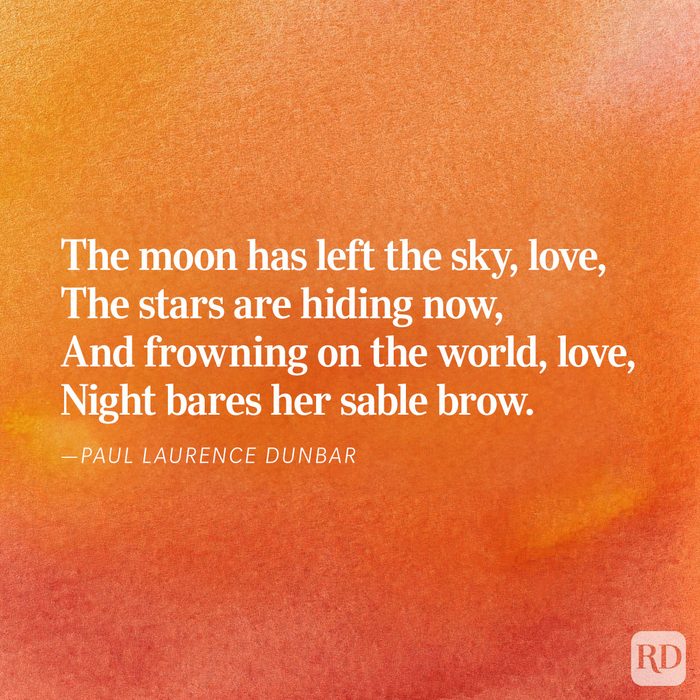
10. “Night of Love” by Paul Laurence Dunbar
The moon has left the sky, love,
The stars are hiding now,
And frowning on the world, love,
Night bares her sable brow.
The snow is on the ground, love,
And cold and keen the air is.
I’m singing here to you, love;
You’re dreaming there in Paris.
This is one for lovers in long-distance relationships who simply long to be with their partner. Paul Laurence Dunbar (1872–1906), one of the first Black poets to gain nationwide fame, expresses his yearning for his beloved from a distance in “Night of Love.” As the full poem concludes, he sits patiently at night waiting for the day he sees his lover.
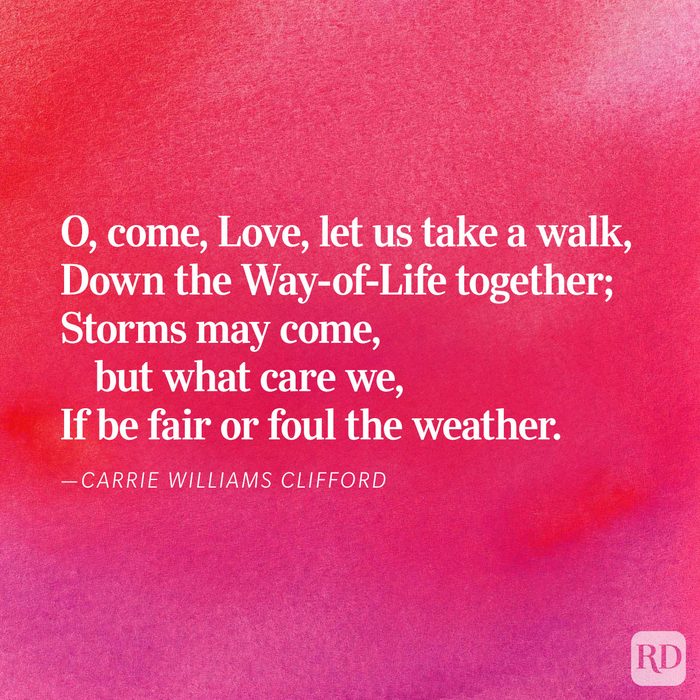
11. “Together” by Carrie Williams Clifford
O, come, Love, let us take a walk,
Down the Way-of-Life together;
Storms may come, but what care we,
If be fair or foul the weather.
When the sky overhead is blue,
Balmy, scented winds will after
Us, adown the valley blow
Haunting echoes of our laughter.
When Life’s storms upon us beat
Crushing us with fury, after
All is done, there’ll ringing come
Mocking echoes of our laughter.
So we’ll walk the Way-of-Life,
You and I, Love, both together,
Storm or sunshine, happy we
If be foul or fair the weather.
“Together” reads more like a vow than a love poem—perfect if you’re proposing or headed down the aisle. Carrie Williams Clifford (1862–1934) sings of commitment and lifelong devotion to walking the path of life together in this inspirational poem.
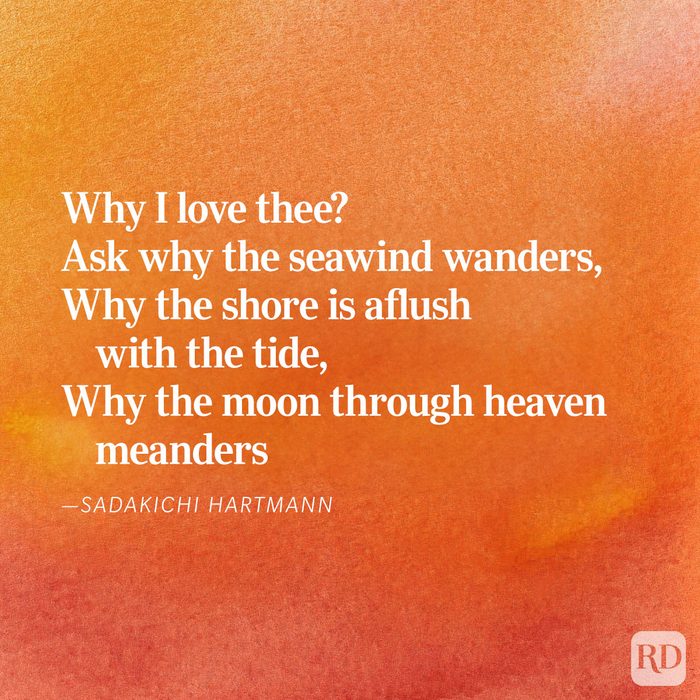
12. “Why I Love Thee?” by Sadakichi Hartmann
Why I love thee?
Ask why the seawind wanders,
Why the shore is aflush with the tide,
Why the moon through heaven meanders;
Like seafaring ships that ride
On a sullen, motionless deep;
Why the seabirds are fluttering the strand
Where the waves sing themselves to sleep
And starshine lives in the curves of the sand!
And at end our list is a beautiful love declaration by Sadakichi Hartmann (1867–1944), a writer of German-Japanese heritage who became an important Asian American author. It reads almost like a nature poem as he compares the question of why we love someone to the natural world of an ocean shore—there’s no answer as to why it exists; it just is. We love someone because we do, which is as natural as the wind, tide, waves and birds.
Why trust us
At Reader’s Digest, we’ve been sharing our favorite books for over 100 years. We’ve worked with bestselling authors including Susan Orlean, Janet Evanovich and Alex Haley, whose Pulitzer Prize–winning Roots grew out of a project funded by and originally published in the magazine. Through Fiction Favorites (formerly Select Editions and Condensed Books), Reader’s Digest has been publishing anthologies of abridged novels for decades. We’ve worked with some of the biggest names in fiction, including James Patterson, Ruth Ware, Kristin Hannah and more. The Reader’s Digest Book Club, helmed by Books Editor Tracey Neithercott, introduces readers to even more of today’s best fiction by upcoming, bestselling and award-winning authors. For this piece on love poems for her, Akram Herrak tapped his experience as a journalist who covers poetry for Reader’s Digest to ensure that all information is accurate and offers the best possible advice to readers. We verify all facts and data, back them with credible sourcing and revisit them over time to ensure they remain accurate and up to date. Read more about our team, our contributors and our editorial policies.
Sources:
- Academy of American Poets: “She Walks in Beauty”
- Academy of American Poets: “X Rays”
- Academy of American Poets: “Love Sleep”
- Academy of American Poets: “The First and Last”
- Academy of American Poets: “Night of Love”




















